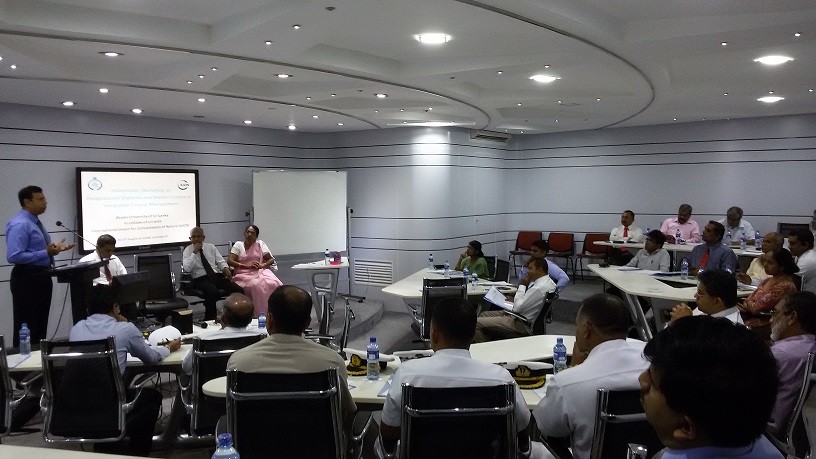Developing Postgraduate Diploma and Masters Courses in Integrated Coastal Management in Sri Lanka
As an Island the coastal zone of Sri Lanka plays a critical role in socio-economic development and therefore requires high level of human capacity to manage the coastal areas scientifically and effectively. With a coast line extending up to about 1,650 km, Sri Lanka’s coastal region is characterized by high population density; a diverse array of highly productive coastal ecosystems and associated resources that serve to maintain a range of important economic activities such as fishing, tourism and other industries.

Dr Ananda Mallawatantri, Country Representative IUCN Sri Lanka addressing the gathering
Photo: IUCN Sri Lanka
As the zone between the land and ocean, the coastal area is impacted by both land and ocean processes making the coastal management an integrated subject that require consideration of land and ocean knowledge, among other environmental processes. In addition, the coastal area is highly populated adding social dynamics to the picture.
Management of Coastal Zone is therefore recognized as an integrated approach. The Integrated Coastal Management (ICM) involves collaboration between multiple stakeholder agencies and coastal communities, as practiced in many parts of the world. In Sri Lanka the major challenge in ICM is the lack of professionally qualified personnel.
In order to provide the much needed qualified professionals into the integrated coastal management workforce, the Ocean University of Sri Lanka has taken steps to offer a Postgraduate Diploma and a Masters course in Integrated Coastal Management. The curriculum of these programmes will be developed in collaboration with IUCN Sri Lanka with financial assistance from Mangroves for the Future (MFF) initiative. To discuss the course contents of above courses and to identify resource personnel, a meeting was held at Sri Lanka Institute of Development Administration (SLIDA) in Colombo on 2 August 2016.
Welcoming the participants, Mr Thilak Dharmaratne, Vice Chancellor, Ocean University said two thirds of world cities occur in the coastal zone which is biologically rich and highly productive. He added that the ICM concept was born in 1992 during the Earth Summit of Rio de Janeiro and elaborated on the types of ICM courses that the Ocean University proposes to offer.
Addressing the gathering, Dr Ananda Mallawatantri, Country Representative, IUCN Sri Lanka said that the nature is at cross roads. The recent accelerated development has an impact on natural resources and highlighted the importance of having the right kind of people as managers. “Negotiations need facts and lack of science-based knowledge will have a tendency to make wrong decisions”, said Dr Mallawatantri and emphasized the need to build young generation to fill the capacity gap.
At this meeting, the 33 participants representing 25 organizations including three universities discussed the course contents. The group will meet in two weeks time to finalize the course contents and lecturers.
Since 2011, Funded by MFF, 14 persons representing government institutions, universities and NGOs have followed the Post-graduate certification course in ICM at the Asia Institute of Technology, Thailand. From 2016, MFF has decided to finance this course at national level enabling a larger number of students to enjoy this benefit.
